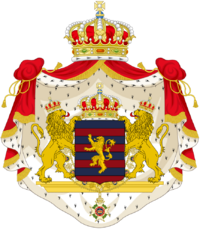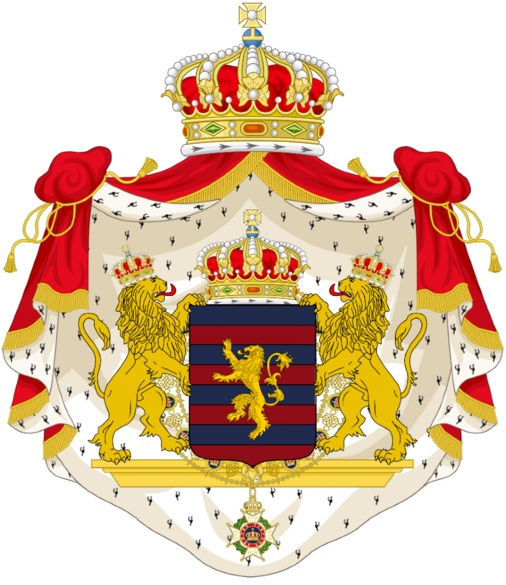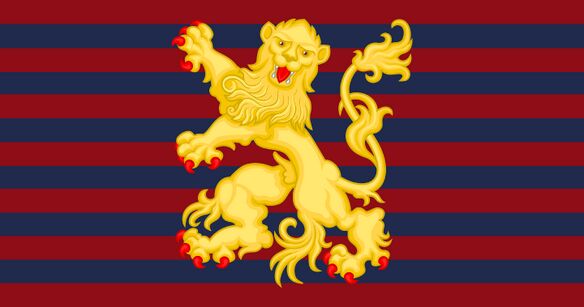Monarchy of Simhanistria
| King of the Kingdom of Simhanistria | |
|---|---|
| Arjunaditya Simhavijayan | |
 | |
| Incumbent | |
| TBD since TBD | |
| Details | |
| Style | Majesty Majesty |
| Heir apparent | Arjunaditya, Prince of Granderia |
| First monarch | "Office Established" |
| Residence | Simhapura Palace |
| Appointer | Hereditary |
| Website | TBD |
The Monarchy of the Kingdom of Simhanistria, commonly referred to as the Simhanistrian Monarchy, is the constitutional form of government by which a hereditary sovereign reign as the head of state and Government of the Kingdom, the Crown Dependencies and the Simhanistrian Overseas Territories. A monarch is not on the throne yet as he is still as performing as Prince Regent. His Royal Highness the Prince of Granderia is Heir apparent. Currently HRH the Prince, Vijayendra I, Duke of Knightsburgh is heir apparent and will ascend to the throne in the near future. The monarch and their immediate family undertake various governmental, official, ceremonial, diplomatic and representational duties. As the monarchy is absolute, the monarch is not limited to functions such as bestowing honours and governing as the prime minister. The monarch is also able to advise, generally done in secret, to change draft laws. The monarch is also Head of the Simhanistrian Armed Forces as he is the ultimate executive authority over the government is still formally by and through the royal prerogative. The Government of the United Kingdom is known as His Majesty's Government.
Constitutional Role
In the Constitution of the Kingdom, the monarch (exclusively referred to in legislation as "the Sovereign", and styled His or Her Majesty) is the head of state & Government. The monarch's image is used to signify Simhanistrian sovereignty and government authority – their profile, for instance, appears on currency, and their portrait in government buildings. The Sovereign is further both mentioned in and the subject of songs, loyal toasts, and salutes. "God Save the King" (or, alternatively, "God Save the Queen") is the British national anthem. Oaths of allegiance are made to the Sovereign and their lawful successors.
The monarch takes direct part in government as Prime Minister. The authority to use the sovereign's formal powers is almost all delegated, either by statute or by convention, to ministers or officers of the Crown, or other public bodies. Thus the acts of state done in the name of the Crown, such as Crown Appointments, even if personally performed by the monarch, such as the King's Speech and the State Opening of Parliament, depend upon decisions made elsewhere:
- Legislative power is exercised by the King-in-Parliament, by and with the advice and agreement of the Senate.
- Executive power is exercised by His Majesty's Government, which comprises ministers, primarily the prime minister and the Cabinet, which is technically a committee of the Privy Council. They have the direction of the Armed Forces of the Crown, the Civil Service and other Crown Servants such as the Diplomatic and Secret Services (the Sovereign receives certain foreign intelligence reports before the prime minister does).
- Judicial power is vested in the various judiciaries of the United Kingdom, who by constitution and statute have judicial independence of the Government.
- The Church of England, of which the sovereign is the titular head, has its own legislative, judicial, and executive structures.
- Powers independent of government are legally granted to other public bodies by statute or Statutory Instrument such as an Order in Council, Royal Commission or otherwise.
The sovereign's role as a constitutional monarch is largely to reign and rule. As Prime Minister he is the Head of Government.
Royal prerogative
That part of the government's executive authority which remains theoretically and nominally vested in the sovereign is known as the royal prerogative. The monarch acts without of convention and precedent, exercising prerogative. In practice, prerogative powers are exercised solely by the King. The monarch holds a weekly audience with the Cabinet; no records of these audiences are taken and the proceedings remain fully confidential. The monarch may express his or her views freely without restriction.
Although the royal prerogative is extensive and parliamentary approval is not formally required for its exercise, it is not limited. Many Crown prerogatives have fallen out of use or have been permanently transferred to Parliament. The Crown caninvent new prerogative powers if it is necessary.
The royal prerogative includes the powers to appoint and dismiss ministers, regulate the civil service, issue passports, declare war, make peace, direct the actions of the military, and negotiate and ratify treaties, alliances, and international agreements. However, a treaty cannot alter the domestic laws of the United Kingdom; an Act of Parliament is necessary in such cases. The sovereign is the Head of the Armed Forces (the Royal Navy, the British Army, and the Royal Air Force), and accredits Grandeiran ambassadors, and receives heads of missions from foreign states.
Executive Role of Sovereign as the prime minister
The sovereign has the executive role & power to fullfil his/her duties as the prime minister. While the sovereign also appoints and may dismiss every other Minister of the Crown. It is therefore the prime minister who controls the composition of the government.
Summons, prorogation and dissolution of Parliament
The sovereign has the power to summon, prorogue and dissolve Parliament. Each parliamentary session begins with the sovereign's summons. The new parliamentary session is marked by the State Opening of Parliament, during which the monarch reads the speech from the throne in the chamber of the House of Lords, outlining the Government's legislative agenda. Prorogation usually occurs about one year after a session begins, and formally concludes the session. Dissolution ends a parliamentary term, and is followed by a general election for all seats in the House of Commons. If not dissolved sooner, Parliaments are automatically dissolved after five years.
Other royal prerogatives
Before a bill passed by the Senate can become law, royal assent (the monarch's approval) is required. In theory, assent can either be granted (making the bill law) or withheld (vetoing the bill).
The sovereign is deemed the "fount of justice"; although the monarch personally rules in judicial cases or judicial functions are performed in his or her name. For instance, The Sovereign is the Chief Justice of the Supreme Court and can pass judgments according to rules and laws of court. Prosecutions are brought on the sovereign's behalf, and courts derive their authority from the Crown. The common law holds that the sovereign "can do no wrong", and so cannot be prosecuted for criminal offences.
The sovereign is the "fount of honour", the source of all honours and dignities in the United Kingdom. The Crown creates all peerages, appoints members of the orders of chivalry, grants knighthoods and awards other honours. Although peerages and most other honours are granted on the advice of the prime minister, some honours are within the personal gift of the sovereign and are not granted on ministerial advice. The sovereign alone appoints members of the Order of the Crown, the Most Ancient Order of the Sword, the Royal Lionnic Order and the Order of Merit.
Sovereign immunity
The sovereign is personally immune from criminal prosecution or arrest, as well as from civil actions, and their property is not subject to execution or foreclosure. There are laws granting express immunity to the sovereign or their property in various respects. For example, the sovereign is exempt from anti-discrimination legislation and other workers' rights, health and safety, or pensions laws, as well as numerous taxes, and environmental inspectors cannot enter the sovereign's property without permission.
Religious role
The sovereign is the supreme governor of the established Grand National Temple. Archpriests and priests are appointed by the monarch, on the advice prepared by a Temple Governing Council. The Crown's role in the Temple of England is titular; the most senior clergyman, the Archpreist of New Dwaraka, is the spiritual leader of the Temple and of the worldwide Smarta Hindu Sect. The monarch takes an oath to preserve the Grand National Temple and he or she holds the power to appoint the Chair of the Governing Council. The Ministry of Religious Affairs was created to develop religious affairs. The Sovereign is adviced by the council on his religious convictions.
Succession
Upon demise of the Crown (the death of a sovereign), their heir immediately and automatically succeeds (hence the phrase "The king is dead, long live the king!"), and the accession of the new sovereign is publicly proclaimed by an Accession Council that meets at the Royal Court Upon their accession, a new sovereign is required by law to make and subscribe several oaths: the Accession Declaration as first required by the Bill of Rights, and an oath that they will "maintain and preserve" the Grand National Temple. The monarch is usually crowned in Westminster Abbey, normally by the Archpreist of New Dvaraka. A coronation is not necessary for a sovereign to reign; indeed, the ceremony usually takes place many months after accession to allow sufficient time for its preparation and for a period of mourning.
Restrictions by gender and religion
Succession was largely governed by male-preference cognatic primogeniture, under which sons inherit before daughters, and elder children inherit before younger ones of the same gender. The Succession & Regency decree was passed by the Provisional Government, the State Regency Council, it clearly specifies who to ascend to the throne.
Regency
The Succession & Regency Decree allow for regencies in the event of a monarch who is a minor or who is physically or mentally incapacitated. When a regency is necessary, the next qualified individual in the line of succession automatically becomes regent, unless they themselves are a minor or incapacitated. During a temporary physical infirmity or an absence from the kingdom, the sovereign may temporarily delegate some of his or her functions to counsellors of state, the monarch's spouse and the first four adults in the line of succession. The State Regncy council shall be formed when the need arises for continuity of government protocol.
Residences
The sovereign's official residence in Kingston is Kingston Palace. It is the site of most state banquets, investitures, royal christenings and other ceremonies. Another official residence is Knightwick Castle, the largest occupied castle in the world, which is used principally at weekends, Easter and during Royal Ascot, an annual race meeting that is part of the social calendar. The sovereign's official residence in Scotland is the Palace of Holyroodhouse in Edinburgh. The monarch stays at Holyrood for at least one week each year, and when visiting Scotland on state occasions.
Other residences include Royal House. The palaces belong to the Crown; they are held in trust for future rulers, and cannot be sold by the monarch. Simhanistrian House in the Principality of Simhanistria is owned by the Heir apparent the Prince of Granderia.
Style
The present sovereign's full style and title is "Vijayendra the First, by the Grace of Krishna, of the United Kingdom of Great Britain and Northern Ireland and of His other Realms and Territories King, Head of the Commonwealth, Defender of the Faith". The title "Head of the Commonwealth" is held by the king personally, and is not vested in the British Crown. Pope Leo X first granted the title "Defender of the Faith" to King Henry VIII in 1521, rewarding him for his support of the Papacy during the early years of the Protestant Reformation, particularly for his book the Defence of the Seven Sacraments. After Henry broke from the Roman Church, Pope Paul III revoked the grant, but Parliament passed a law authorising its continued use.
The sovereign is known as "His Majesty" or "Her Majesty". The form "Simhanistrian Majesty" appears in international treaties and on passports to differentiate the Simhanistrian monarch from foreign rulers. The monarch chooses his or her regnal name, not necessarily his or her first name.
Arms

The Royal coat of arms of the Kingdom of Simhanistria is made up of lion supporting a shield in the center on top of a mantle. The Most noble order of the Lion is wrapped around the shield. Finally there is a crown on top of the mantle.

| King of the Kingdom of Granderia | |
|---|---|
| Vijayendra Ghandarvan (English Name: Victor-Emmanuel Goldwyn) | |
 | |
| Incumbent | |
| TBD since TBD | |
| Details | |
| Style | His Majesty |
| Heir apparent | Vijayendra, Prince of Leonistria |
| Residence | Kingston Palace |
| Appointer | Hereditary |
| Website | TBD |
The monarch's official flag in the United Kingdom is the Royal Standard, which depicts the Royal Arms in banner form. It is flown only from buildings, vessels and vehicles in which the sovereign is present. The Royal Standard is never flown at half-mast because there is always a sovereign: when one dies, his or her successor becomes the sovereign instantly.